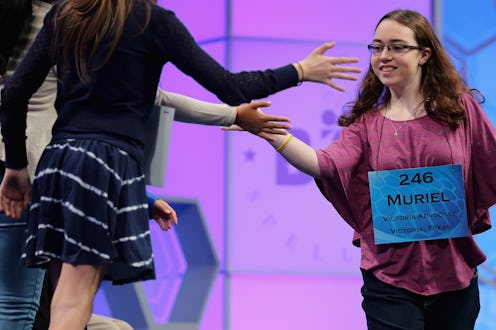News
The Number Of Girls In The Scripps Spelling Bee

In 1925, Frank Neuhaser won the first national spelling bee by correctly ordering the letters of "gladiolus." Even without the live television broadcasts many have come to know and love, Americans were hooked. The Scripps Spelling Bee has been in official business for 90 years now, and according to its 2017 guide, holds the enviable distinction of being the nation's "longest-running educational program." Its history also boasts a remarkably gender-equal distribution of spelling champs: 48 of the past 96 winners were girls. This year, that laudable trend continues. Of the 291 youngsters who are competing, 138 of those spelling bee finalists are girls.
The first female winner dates back to 1926. Just one year after Neuhaser took home the first spelling bee trophy, Pauline Bell became the second official champion with the winning word "cerise." In fact, seven of the first ten winners were girls, a seeming historic miracle, given that in the 1920s, men outnumbered women as college graduates at a rate of two-to-one.
Some early spelling bee developments have stayed with the competition. In 1930, NBC ran a live radio broadcast of the final hour, a precursor of today's televised finale. And as early as 1936, spelling bee finalists were invited to the White House, a trip that remains a prestigious side perk.
Spelling bees don't just make headlines once a year in Washington, D.C. Over the past fifteen years in particular, the annual competition bestowing on one (occasionally two) gifted young person the glories of top speller has been the subject of several films. Spellbound premiered in 2002, a documentary centering on eight contestants in the 1999 Scripp's National Spelling Bee. The film's unexpected popularity launched so many follow-ups that Dana Stevens at the New York Times commented, " the spelling-bee film is fast becoming a genre unto itself."
In fact, the subsequent Akeelah and the Bee was finally picked up for production, after the success of Spellbound demonstrated that audiences were eager to get more up close and personal with the inner workings of spelling bees and their various contestants.
Which leads us to the most controversial of spelling bee spinoffs, Bad Words. The irreverent comedy traces the outlandish journey of potty-mouth extraordinaire Guy Trilby (Jason Bateman) while he competes as a bitter adult man against teens and tweens in the national spelling bee. It's part revenge-plot, part buddy tale, with tense spell-downs as backdrop.
Given the laudable history of gender equality in Scripp's National Spelling Bee, this year's competition will likely be uplifting and unoffensive.